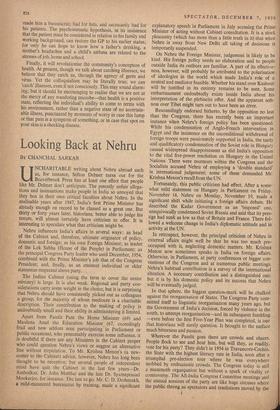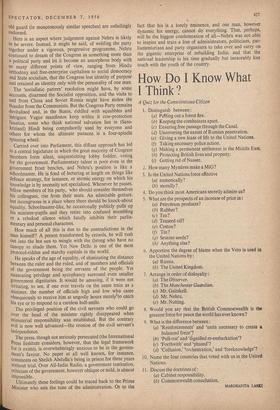Looking Back at Nehru
BY CHANCHAL SARKAR UNCHARITABLE writing about Nehru abroad such as, for instance, Sefton Delmer turns out for the Beaverbrook Press has at least one effect that people like Mr. Delmer don't anticipate. The patently unfair allega- tions and insinuations make people in India so annoyed that they box in their own critical faculties about Nehru. In the malleable years after 1947, India's first Prime Minister has already enough on record to be classed as a great one. But thirty or forty years later, historians, better able to judge his tenure, will almost certainly have criticism to offer. It is interesting to speculate what that criticism might be.
Nehru influences India's affairs in several ways : as head of the Cabinet and, therefore, ultimate originator of policy, domestic and foreign; as his own Foreign Minister; as leader of the Lok Sabha (House of the People) in Parliament; as the principal Congress Party leader who until December, 1954, combined with the Prime Minister's job that of the Congress President; and, finally, as an eminent individual or elder statesman respected above party.
The Indian Cabinet (using the term to cover the entire ministry) is large. It is also weak. Regional and party con- siderations carry some weight in the choice, but it is surprising that Nehru should have consistently picked out as colleagues a group, for the majority of whom mediocre is a charitable description. Their contribution to the making of policy is undoubtedly small and their ability in administering it limited.
Apart from Pandit Pant the Home Minister (69) and Maulana Azad the Education Minister (67, exceedingly frail and now seldom seen participating in Parliament or public occasions), who presumably exercise some influence, it is doubtful if there are any Ministers in the Cabinet proper who could question Nehru's views or suggest an alternative line without trepidation. To Mr. Krishna Menon's (a new- comer to the Cabinet) advice, however. Nehru has long been thought to be receptive; but several people of independent mind have quit the Cabinet in the last few years—Dr. Ambedkar, Dr. John Matthai and the late Dr. Syamaprasad Mookerjee, for instance. The last to go, Mr. C. D. Deshmukh, a mild-mannered bureaucrat by training, made a significant explanatory speech in Parliament in July accusing the Prime Minister of acting without Cabinet/consultation. It is a stock pleasantry (which has more than a little truth in it) that when Nehru is away from New Delhi all taking of decisions is temporarily suspended.
On Nehru the Foreign Minister. judgement is likely to be kind. His foreign policy needs no elaboration and to people outside India its outlines are familiar. A part of its effective- ness, however, will probably be attributed to the polarisation of ideologies in the world which made India's role of a neutral and mediator feasible. Whether his stand over Kashmir will be justified in its entirety remains to be seen. Some embarrassment undoubtedly exists inside India about his interpretation of the plebiscite offer. And the apparent soft- ness over Tibet might turn out to have been an error.
Resoundingly endorsed hitherto, by the opposition no less than the Congress, there has recently been an important instance when Nehru's foreign policy has been questioned.
While his condemnation of Anglo-French intervention in Egypt and the insistence on the unconditional withdrawal of foreign troops were passionately supported in India, the tardy and qualificatory condemnation of the Soviet role in Hungary caused widespread disappointment as did India's opposition to the vital five-power resolution on Hungary in the United Nations. There were murmurs within the Congress and the Socialists accused Nehru of employing a 'double standard' in international judgement; some of them demanded Mr. Krishna Menon's recall from the UN.
Fortunately, this public criticism had effect. After a some- what mild statement on Hungary in Parliament on Friday.
November 16, Nehru on Monday, November 19. made a significant shift while initiating a foreign affairs debate. He described the Kadar Government as an 'imposed' one, unequivocally condemned Soviet Russia and said that its pres- tige had sunk as low as that of Britain and France. There fol- lowed a welcome change in India's diplomatic attitude and in activity at the UN.
In retrospect, however, the principal criticism of Nehru in external affairs might well be that he was too much pre- occupied with it, neglecting domestic matters. Mr. Krishna Menon now sometimes speaks in India on foreign affairs. Otherwise, in Parliament, at party conferences or bigger con- ventions of the Congress and at numerous public meetings. Nehru's habitual contribution is a survey of the international situation. A necessary contribution and a distinguished one. but it is by his domestic policy and its success that Nehru will be eventually judged.
In that sphere, the biggest question-mark will be chalked against the reorganisation of States. The Congress Party com- mitted itself to linguistic reorganisation many years ago, but the Government of India's decision, forced by violence in the south, to attempt reorganisation—and its subsequent fumbling —even before the first Five-Year Plan was completed, is one that historians will surely question. It brought to the surface much bitterness and passion.
Wherever the Pandit goes there are crowds and cheers. People flock to see and hear him, but will they, as readily, vote for his party? They didn't in 1954 in Travancore-Cochin, the State with the highest literacy rate in India, soon after a triumphal pre-election tour where he was everywhere mobbed by enthusiastic crowds. The Congress today is still a mammoth organi,sation but without a spark of vitality or controversy. The All-India Congress Committee meetings and the annual sessions of the party are like huge circuses where the public throng as spectators and resolutions moved by the old guard (in monptonously similar speeches) are unfailingly endorsed.
Here is an aspect where judgement against Nehru is likely to be severe. Instead, it might be said, of welding the party together under a vigorous, progressive programme, Nehru continued to dream of the Congress as something more than a political party and let it become an amorphous body with so many different points of view, ranging from Hindu orthodoxy and free-enterprise capitalism to social democracy and State socialism, that the Congress lost identity of purpose and retained an identity only with the personality of one man.
The 'socialistic pattern' resolution might have, by some accounts, disarmed the Socialist opposition, and the visits to and from China and Soviet Russia might have stolen the thunder from the Communists. But the Congress Party remains devitalised and, in the States, riddled with squabbles and intrigues. Vague manifestos keep within it cow-protection fanatics, some who think national salvation lies in (Sans- kritised) Hindi being compulsorily used by everyone and others for whom the ultimate panacea is a four-spindle spinning wheel.
Carried over into Parliament, this diffuse approach has led to a central legislature in which the great majority of Congress members form silent, unquestioning lobby fodder, voting for the government. Parliamentary talent is poor even in the government front benches, and Nehru's position is like a schoolmaster. He is fond of lecturing at length on things like defence strategy, for instance, or atomic energy on which his knowledge is by necessity not specialised. Whenever he passes. fellow members of his party, who should consider themselves his colleagues, rise from their seats. An admirable gesture. but incongruous in a place where there should be knock-about equality. Schoolmaster-like, he occasionally publicly pulls up his minister-pupils and they retire into confused mumbling or a rebuked silence which fatally inhibits their parlia- mentary and personal characters.
How much of all this is due to the contradictions in the Man himself? A person transformed by crowds, he will rush out into the hot sun to mingle with the throng who have no canopy to shade them. Yet New Delhi is one of the most protocol-ridden and starchy capitals in the world.
He speaks of the age of equality, of eliminating the distance between the ruler and the ruled, and of members and officials of the government being the servants of the people. Yet nauseating privilege and sycophancy surround even smaller government dignitaries. It would be amusing, if it were not irritating, to see, if one ever travels on the same train as a Minister, the number of officials high and low who came obsequiously to receive him at ungodly hours merely'to catch his eye or to respond to a careless half-smile.
The privileged position of the civil servants who could go over the head of the minister rightly disappeared when ministerial responsibility was established. But the contrary evil is now well advanced—the erosion of the civil servant's independence.
The press, though not seriously persecuted (the International Press Institute considers, however, that the legal framework for it exists), is overwhelmingly anxious to be in the govern- ment's favour. No paper at all well known, for instance, comments on Sheikh Abdulla's being in prison for three years without trial. Over All-India Radio, a government institution, criticism of the government, however oblique or mild, is almost impossible.
Ultimately these feelings could be traced back to the Prime Minister who sets the tone of the administration. Or to the fact that his is a lonely eminence, and one man, however dynamic his energy, cannot do everything. That, perhaps, will be the biggest condemnation of all—Nehru was not able to inspire and train a line of administrators, politicians, par- liamentarians and party organisers to take over and carry on the gigantic enterprise of rebuilding India; and that the national leadership in his time gradually but inexorably lost touch with the youth of the country.



































 Previous page
Previous page